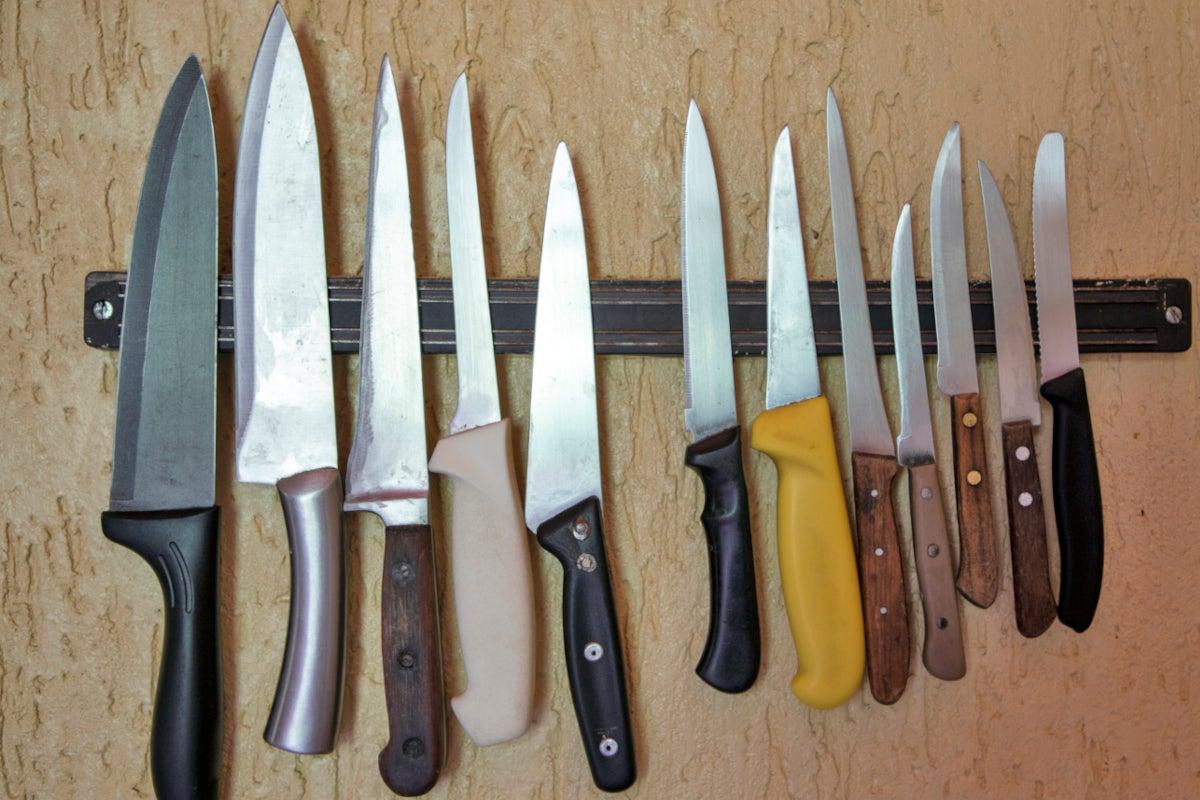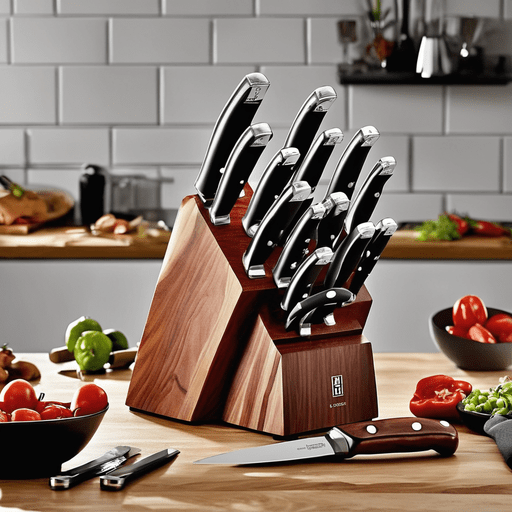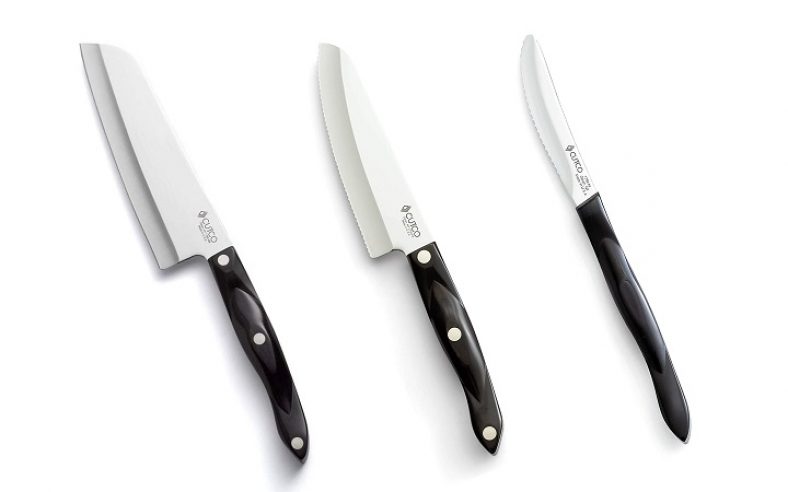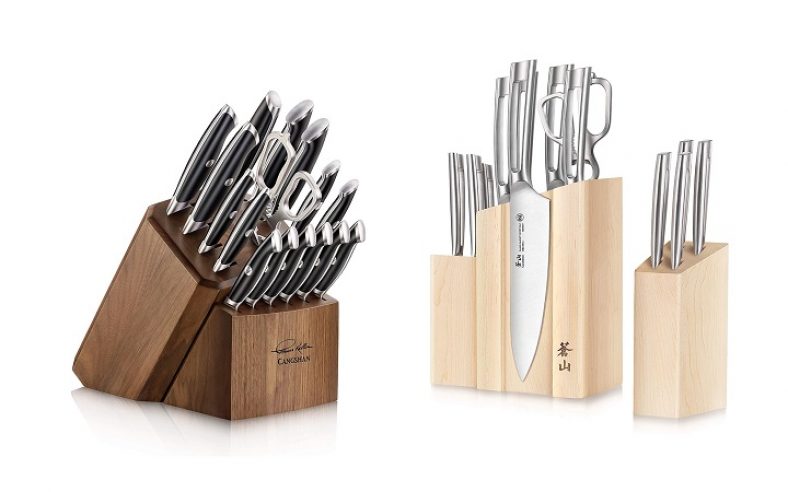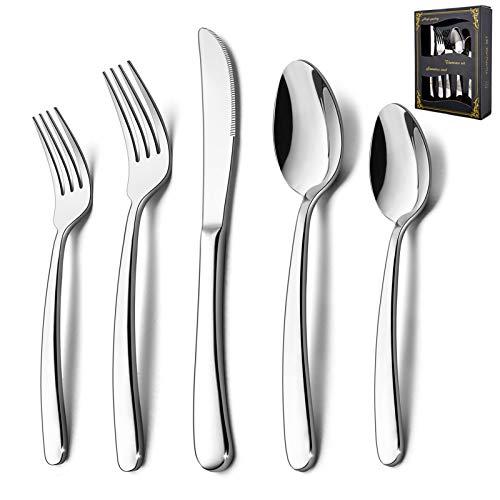To dispose of kitchen knives, wrap them in several layers of newspaper or cardboard and then place them in a plastic bag. Dispose of the bag in a bin designated for sharp objects.
Kitchen knives are essential tools in the kitchen. However, they can become dull or damaged over time, making them unsafe to use. When it is time to dispose of these sharp objects, it is important to follow proper safety measures.
Simply throwing them in the bin can be dangerous for waste collectors who may get injured. This article explains how to dispose of kitchen knives safely and appropriately. Whether you have a single knife or a set of knives to dispose of, this guide will provide insights on the safest and most responsible way to handle dull, broken or unwanted kitchen knives.

Credit: www.amazon.com
The Importance Of Safe Knife Disposal
Kitchen knives are essential tools to have in every kitchen. Over time, these knives wear out or become dull, making them unusable. Regardless of why a knife is no longer useful, proper disposal is crucial. Throwing away knives in the trash can be hazardous, and without caution, you could end up injured or worse.
Keep yourself and others safe by following proper knife disposal techniques.
The Risks Involved In Improper Knife Disposal:
Improper disposal of kitchen knives is not only illegal but can be incredibly dangerous. Here are some of the risks involved:
- Serious harm or injury to sanitation workers as they dispose of trash in landfills.
- The dangers of children coming across knives in the trash cans.
- Injuries to others if knives are disposed of improperly and found by anyone.
- The risk of cuts and punctures when disposing of blunt knives in the trash.
The Benefits Of Proper Knife Disposal:
Properly disposing of kitchen knives offers many benefits, not only for safety reasons but also for the environment. Here are some advantages:
- It’s safer for sanitation workers who collect trash from landfills.
- It’s safer for your household and everyone around you.
- Proper disposal can be environmentally friendly by either recycling or donating the knives.
- It reduces the risk of potential injuries that can be caused by the improper disposal of harmful materials.
Understanding Local Knife Disposal Regulations:
Before disposing of any knife, it’s crucial to understand the local knife disposal regulations in your area. This means understanding the laws and guidelines put in place by your state or local council on how to dispose of knives safely.
In most cases, you will need to follow the steps below:
- Check local knife disposal guidelines for your locality.
- Wrap the knife in newspaper or cardboard to reduce the chances of injury.
- Label the package with the words ‘sharp object’ to notify sanitation workers that caution should be exercised.
- Reach out to local recycling centers or blade banks to dispose of your knives safely.
Proper knife disposal is crucial for everyone’s safety. By following the appropriate local regulations and taking action, you can ensure that your household and the environment are safe from unnecessary harm.
Options For Safe Knife Disposal
If you have old kitchen knives that you need to get rid of, it’s important to do so safely and effectively. Below are some options for disposing of knives safely:
Recycling Metal Blades
Recycling knife blades is a great way to reduce waste and reuse materials. Follow these steps to recycle metal blades:
- Wrap the knives tightly in paper or cardboard to prevent any injuries during the disposal process.
- Place the wrapped knives in a container such as a tin can or plastic bottle.
- Seal the container with tape, so nothing falls out.
- Label the container “sharp metal” or the appropriate warning label.
- Drop the container off at your local recycling facility for metal recycling.
Recycling Plastic Handles
Most kitchen knives have plastic handles that can be recycled. Follow these steps to recycle plastic handles:
- Remove the blade from the handle if possible.
- If the blade cannot be removed, wrap the entire knife in paper or cardboard before separating the handle from the blade.
- Check with your local recycling facility to see if they accept plastic knife handles.
- If they do, recycle the plastic handle in your regular plastic recycling bin.
Donating Old Knives
Another option for disposing of kitchen knives is to donate them. Here are some organizations that accept knife donations:
- Local shelters or soup kitchens
- Homeless shelters
- Cooking schools or culinary programs
Before donating, ensure the knives are clean and in good condition.
Repurposing Old Knives
If your old knives aren’t in good enough condition to donate or recycle, you can still repurpose them. Here are some ideas for repurposing old knives:
- Use the handles for diy projects such as creating a knife block or cutting board.
- Use the blades as garden tools such as small shovels or garden markers.
- Use the blades as letter openers or other small cutting tools around the home.
By following these safe disposal methods, you can contribute to a cleaner environment and prevent unnecessary injuries.
How To Recycle Metal Knife Blades
As we all know, recycling is an essential step in protecting the environment and reducing waste. Metal knife blades are one of those materials that can be recycled and repurposed instead of being thrown away in the trash. Here’s how you can recycle your metal knife blades:
Preparing Knives For Recycling
Before you start the recycling process, you need to ensure that the knives are adequately prepared. Here are the key points to keep in mind:
- Clean the blades of any food or grease residue. Use warm water, dish soap, and a sponge to clean the blades.
- Dry the blades completely before recycling them to avoid any rust or corrosion.
- When discarding the handles, separate them from the metal blades.
Finding Recycling Centers Near You
Now that you’ve prepared the knives, you can start finding recycling centers near you. Here are some key points to consider:
- Research and make a list of metal scrap yards or recycling centers in your area that accept metal knife blades.
- Check the regulations of your city or town to make sure you can recycle metal knife blades.
- Call the recycling center to confirm that they accept metal knife blades before visiting.
Tips For Shipping Blades For Recycling
If there’s no recycling center in your area or the one you’ve found isn’t taking metal knife blades, you can still recycle them by shipping them to a recycling center. Here are some tips to keep in mind when shipping metal knife blades:
- Use a sturdy box to package the knives and prevent any damage during shipping.
- Make sure to properly label the box as “knives for recycling.”
- Use shipping carriers that specialize in hazardous materials to comply with shipping regulations.
Recycling metal knife blades is essential for keeping our environment clean and reducing waste. By following these guidelines, you’ll be able to take the first step in keeping our planet healthy and safe!
How To Recycle Plastic Knife Handles
Disposing of kitchen knives when they’re past their prime can create challenges. Knife blades can be sharp and dangerous, so care must be taken when throwing them away. However, it’s not just the blades that can be an issue. Knife handles can also be a problem, particularly if they are made of plastic.
Most local recycling programs don’t accept plastic handles, which can leave you in a quandary about how to dispose of them properly. This article explores some ideas for recycling plastic handles and how to prepare them for recycling.
Preparing Handles For Recycling
Before you can recycle plastic knife handles, they need to be prepared properly. Improper preparation can result in damaged recycling equipment or contamination which can ruin a load of recyclables. Here’s what you need to do:
- Clean the handles thoroughly with soap and water. Make sure that all food residue is removed.
- Remove any metal from the handles. Some knives, such as those with serrated blades, may have metal parts in the handle. These parts should be removed before recycling.
- Separate the handles from the blades. Plastic handles without blades can often be recycled with other plastic items, but attached blades are often made from different materials and may have sharp edges.
Finding Recycling Centers Near You
Once your plastic handles are clean and free of contaminants, it’s time to find a recycling center that will accept them. Here are some steps to take:
- Check with your local recycling center or waste management facility to see if they accept plastic knife handles. Not all centers do, so it’s important to check.
- Look for recycling centers that specialize in plastics. Some centers accept more types of plastic than others, so look for one that takes a wide range of materials.
- Use online resources to find recycling facilities near you. Earth911.com and recyclenation.com are two places to start.
Tips For Recycling Plastic Handles
Recycling plastic knife handles is a great way to reduce waste. However, there are a few things to keep in mind to ensure that your recycling efforts are successful. Here are some tips:
- Follow the preparation guidelines provided by the recycling center. These might include instructions on how to separate the handles from the blades or whether to remove any labels or stickers.
- Don’t include plastic handles in your regular recycling bin. Most local curbside recycling programs don’t accept plastic handles, so it’s important to take them to a recycling center that does.
- If you can’t find a recycling center that accepts plastic knife handles, consider repurposing them instead. Handles can be used as stakes for plants, drawer handles, or even in art projects.
Recycling plastic knife handles can help reduce waste and keep our environment clean. By following these tips, you can make sure that your handles are properly prepared for recycling and find a recycling facility that accepts them.
Frequently Asked Questions Of How To Dispose Of Kitchen Knives
How Do I Safely Dispose Of Kitchen Knives?
Wrap the knives in several layers of newspaper or bubble wrap and place them in a sturdy cardboard box. Label the box as sharp and pointy to prevent injury. Contact your local waste management facility to dispose of them properly.
Can I Place Kitchen Knives In The Trash?
No. Throwing knives in the trash can be dangerous to others handling the waste. It can also damage the trash bag and cause injuries to garbage collectors. Therefore, it is not recommended to dispose of kitchen knives in the trash.
Can I Recycle Old Kitchen Knives?
No, kitchen knives cannot be recycled because they are made of steel and other metals that have a different melting point. Instead, contact your local waste management facility and ask them about proper disposal methods.
Can I Donate My Old Kitchen Knives?
Yes, many charitable organizations accept donations of kitchen knives if they are in good condition. Make sure that the knives are sharp, clean, and safe to use before donating them.
How Often Should I Dispose Of My Kitchen Knives?
It depends on how frequently you use them and how well you maintain them. A well-maintained knife can last for many years. However, if the blade is chipped, cracked, or rusted, it needs to be replaced immediately for safety reasons.
Conclusion
Proper disposal of kitchen knives is crucial in maintaining a safe and secure environment in our homes. To ensure that accidents, injuries, or even crimes do not happen, it’s important to dispose of kitchen knives safely. Whether it’s donating them, recycling, or simply wrapping them properly, you have different options to choose from.
Do not just throw them in the trash bin as it poses a great risk not just to you, but to garbage collectors and other people as well. With a little bit of effort and caution, disposing of kitchen knives can be done safely and easily.
Remember that safety should always be your top priority. By disposing of your kitchen knives properly, you’re not just taking care of yourself but also protecting the people around you. So, the next time you need to dispose of kitchen knives, be responsible, and choose the right method that works best for you.

